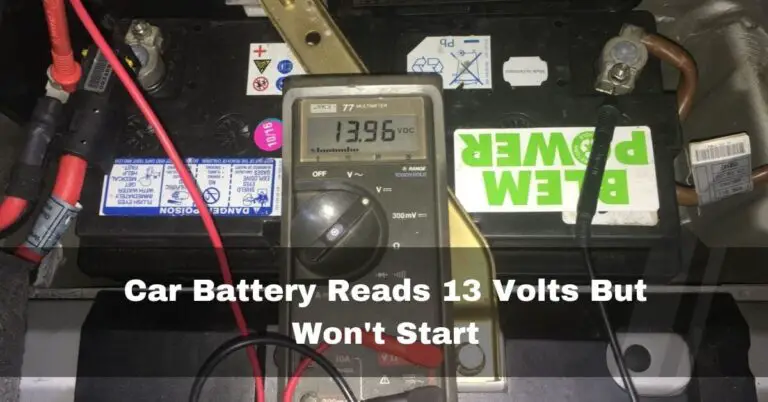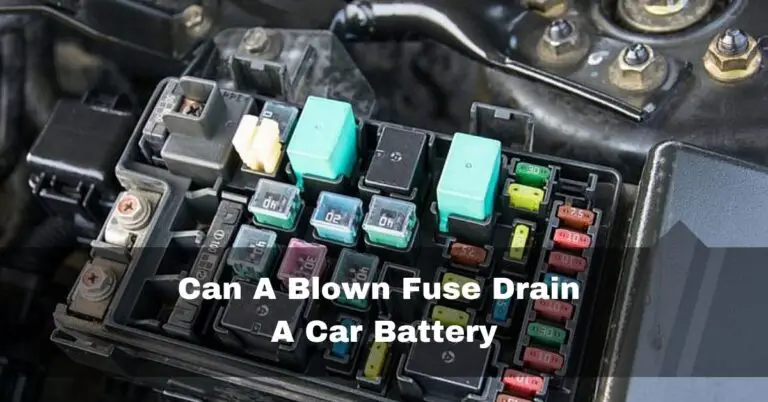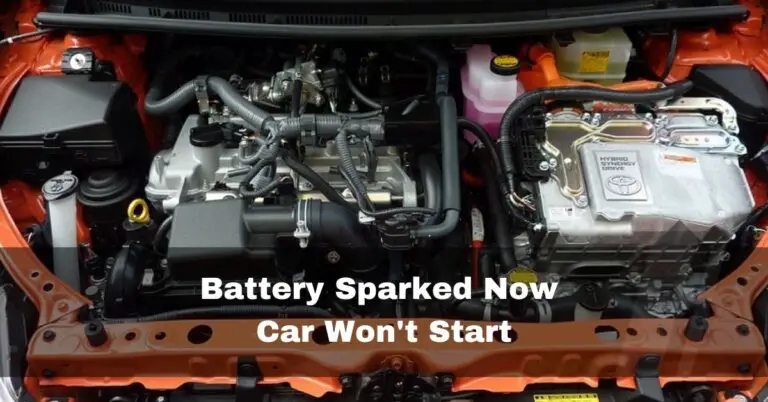Car battery Voltage Low When Running – How To Fix In 2024
In my own experiences as a car owner, I’ve encountered instances where understanding why the battery voltage low while driving became a crucial aspect of vehicle maintenance.
While the basic functions of car batteries are familiar to many drivers, several factors can contribute to a drop in voltage.
Is it normal for a car battery voltage to drop when running?
When the car is running, the multimeter rating should stay in the 14 to 14.5 volt range. Dropping below 14 means either the battery is weak and unreliable for sustained vehicle operation or the alternator fails.
This article will explore some common causes of battery voltage low when car running and how to address them.
Table of Contents
Understanding The Basics Of Car Battery Voltage:
When a car starts, the alternator restores the battery by converting mechanical power from the engine into electrical energy. This procedure maintains the battery charged and is willing to go the next time the car is used.
Normal Battery Voltage When Car Is Running:
Understanding the voltage range of a car battery in different states is crucial for assessing its health and performance. Here’s a breakdown of the typical voltage readings for a car battery:
Resting Voltage (Engine Off):
Car battery voltage when off? A fully charged car battery should measure around 12.6 volts when the engine is off. This is considered the “resting voltage” or the voltage at a stable state when no electrical components are drawing power from the battery.
Also Read: What RPM To Charge Car Battery
Charging Voltage (Engine Running):
When the engine is running, the alternator takes over the role of providing electrical power to the vehicle’s systems. Under normal conditions, the battery voltage will rise, which is expected to be 13.5 to 14.5 volts. This increase indicates that the alternator is charging the battery.
On the other hand, excessively high voltage readings, well above the 14.5-volt range, might suggest a malfunction in the voltage regulator or other charging system components.
Reasons Behind Car Battery Voltage Low When Running:
1. Faulty Alternator:

Also Read: How Long Will A Car Battery Last Without An Alternator
2. Loose Or Corroded Battery Connections:

3. Old Or Worn-Out Battery:
4. Electrical System Issues:
Also Read: How To Fix Reverse Polarity On A Car Battery
5. High Electrical Load:
How To Fix Car Battery Voltage Low When Running:
1. Diagnose Faulty Alternator:
2. Tighten The Connections:
First, turn off the car and disconnect the battery to check for loose or corroded connections. Inspect the battery terminals for any signs of corrosion, and use a wire brush or battery cleaner to remove any buildup. Then, reconnect the battery terminals, ensuring they are tight and secure.
3. Test And Replace Battery:
Run a load test to see if your battery is still charged. This test entails applying a load to the battery for a predetermined period and measuring the voltage decrease. A substantial voltage drop may indicate a worn-out battery.

4. Inspect Electrical System
You may need to consult a professional mechanic to diagnose electrical system issues. They can perform various tests and inspections to identify the root cause of the problem and recommend the most suitable repair.
Also Read: How Long Does It Take To Change A Car Battery
5. Reduce Electrical Load:
To reduce the electrical load on your car battery, try turning off non-essential accessories when driving. For example, please turn off the air conditioner or the radio when necessary. Additionally, upgrading to a battery or alternator with a bigger capacity helps guarantee that your car’s electrical system can support all of its accessories.

car battery voltage drop overnight:
Experiencing a car battery voltage drop overnight is common and can be attributed to various factors. Possible reasons include parasitic drains from electronic components, an aging battery, faulty electrical components, corroded or loose battery connections, extreme temperatures, short circuits, or phantom loads from aftermarket accessories.
To address this, consider performing a parasitic draw test, checking battery connections, and evaluating the battery’s overall health. If issues persist, seeking professional assistance is recommended for a thorough diagnosis and necessary repairs.
Related Questions:
1. What Should My Battery Voltage be While Driving?
2. Can A Low Battery Voltage Cause My Car To Stop When Driving?
3. Can I Jump-Start My Car If The Battery Voltage Is Low While Running?
4. How Can I Prevent Low Battery Voltage When Running?
5. Can A Low Battery Voltage Cause Damage To Other Electrical parts In My Car?
6. What should the voltage of a car battery be at idle?
Looking more closely, we can see that the voltage of a car battery can be anywhere between 12.6 and 14.4. The voltage of a fully charged car battery will be 12.6 volts when the engine is off. We call this “resting voltage.” When the car is going, the battery voltage usually goes up to between 13.5 and 14.5 volts.
7. Why does a car battery voltage drop under load?
Every battery has resistance inside of it. Even though the resistance is small, it is still a resistance. Every time current is taken from the battery, the voltage will drop because of the internal resistance.
8. Why does my battery voltage drop when idling?
The alternator must generate a voltage of approximately 14 volts to charge a 12-volt (really 12.6 volts) automobile battery. It must spin quickly to accomplish it. Because of this, the alternator rarely spins quickly enough to generate the 14 volts at idle; instead, you observe something less, maybe 13.5 volts.
9. How does a vehicle act when the alternator is going out?
Multiple low voltage indicators appear simultaneously, including dim or flickering lights, slow-acting CDL, slow cranking, and erroneous error lights or dash messages. While driving, the engine dies, and everything goes “dead.”
10. How can I test my alternator myself?
Check your alternator with a voltmeter by running your engine at 2000 RPM, checking the battery with the voltmeter, and maintaining the engine running. Your alternator functions properly if the voltage increases from about 12.2 V to about 13–14.5 V. It’s not good if your V increases or drops.
Conclusion:
Also Read:
- How Far Can A Car Drive On Battery Only
- Left Lights On In Car Will Battery Recharge
- Car Only Starts When Jumped Battery Good
- Can A Bad Battery Make Your Car Overheat
References:
- https://www.jdpower.com/cars/shopping-guides/how-to-test-a-car-battery-with-a-multimeter
- https://www.quora.com/Is-it-normal-for-a-car-battery-voltage-to-drop-when-running
- https://www.jiffylube.com/resource-center/car-battery-voltage
- https://mechanics.stackexchange.com/questions/46067/battery-voltage-low-when-car-is-running-should-i-be-concerned






![Battery Light Comes On Under 2000 Rpm – [2024] What To Do](https://vehicleslounge.com/wp-content/uploads/2023/07/Battery-Light-Comes-On-Under-2000-Rpm-768x402.jpeg)
